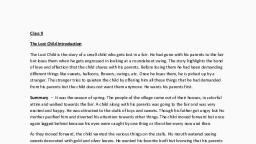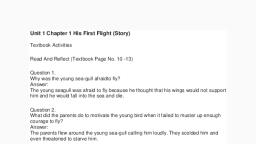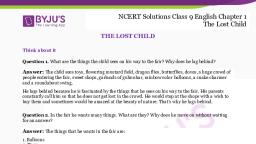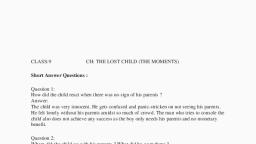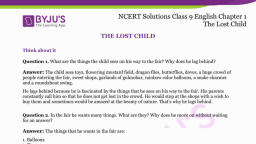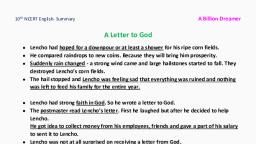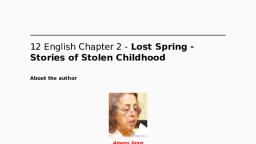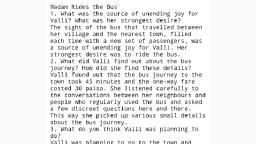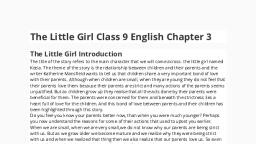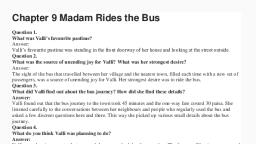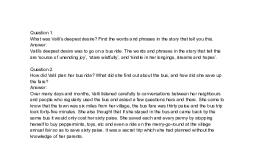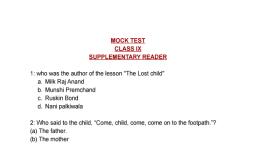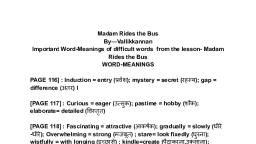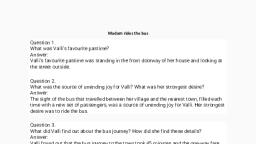Page 1 :
Class 9, The Lost Child Introduction, The Lost Child is the story of a small child who gets lost in a fair. He had gone with his parents to the fair, but loses them when he gets engrossed in looking at a roundabout swing. The story highlights the bond, of love and affection that the child shares with his parents. Before losing them he had been demanding, different things like sweets, balloons, flowers, swings, etc. Once he loses them, he is picked up by a, stranger. The stranger tries to quieten the child by offering him all these things that he had demanded, from his parents but the child does not want them anymore. He wants his parents first., Summary – It was the season of spring. The people of the village came out of their houses, in colorful, attire and walked towards the fair. A child along with his parents was going to the fair and was very, excited and happy. He was attracted to the stalls of toys and sweets. Though his father got angry but his, mother pacified him and diverted his attention towards other things. The child moved forward but once, again lagged behind because his eyes were caught by one thing or the other every now and then., As they moved forward, the child wanted the various things on the stalls. His mouth watered seeing, sweets decorated with gold and silver leaves. He wanted his favorite burfi but knowing that his parents, would refuse on the ground that he was greedy, he walked ahead. Then he saw beautiful garlands of, Gulmohar but didn’t ask for it, then he saw balloons but he knew very well that his parents would deny, due to the fact that he was too old to play with balloons, so he walked away., Then he saw a snake charmer and a roundabout swing. As he stopped to ask his parents for permission, to enjoy the swing, to his astonishment, there was no reply. Neither his father nor his mother was there., Now the child realized that he was lost. He ran here and there but could not find them. The place was, overcrowded. He got terrified but suddenly a kind-hearted man took him up in his arms and consoled, the bitterly weeping child. He asked if he would like to have a joyride but the child sobbed “I want my, father, I want my mother.” The man offered him sweets, balloons and garland but the child kept, sobbing “I want my father, I want my mother.”, Vocabulary words, Brimming over: to be full of something, Lagged behind: was left behind, Fascinated by: attracted to, Lined the way: were set up along the way., Lingering: lasting for a long time, Receding: left behind as he walked ahead, Suppress: put an end to
Page 2 :
Tyrant: a cruel and oppressive ruler, Gaudy: extremely bright and showy, Abreast: side by side and facing the same way, Teeming out: to pour or empty out, Grove: a small wood or group of trees, Capers: a playful skipping movement, Throngs: huge crowds, Converging: gathering, Coarse: unpleasant, Congested: full of, Hefty: large and heavy, Brutal: harsh, rough, Trampled: crushed, Reiterated: repeated, Disconsolate: very unhappy and unable to be comforted, Question Answers, Q1. What are the things the child sees on his way to the fair? Why does he lag behind?, Ans. On his way to the fair, the child sees the following things1. He saw toys that were displayed in the shops lined up on the way., 2. He saw the vast mustard field which seemed like melting gold., 3. There were brightly coloured dragonflies, butterflies and black bees which flapped their wings, and sat on the flowers to suck nectar from them., 4. He also saw little insects and worms along the footpath that were crawling out of the holes in, the footpath to get sunshine., 5. The child saw a dove bird in the grove., 6. Also, he saw hordes of people walking towards the fair., The child often lagged behind because he would watch the different happenings around him. He would, get attracted to these things and would stop in his way. Then, his parents would walk ahead and he, would be left behind.
Page 3 :
Q2. In the fair he wants many things. What are they? Why does he move on without waiting for an, answer?, Ans. In the fair, the boy wanted the following things1., 2., 3., 4., , He wanted to buy a burfi from the sweetmeat seller., He wanted a garland of flowers from the flower seller., Next, he saw a balloon seller and wanted a balloon., When he saw the snake – charmer he was attracted to the music of the flute and wanted to, listen to it., 5. He wanted to take a ride on the roundabout swing., The child moved ahead from all the stalls without waiting for a reply because he knew that his parents, would not heed to his demands. He knew their replies in each case would be as follows –, 1., 2., 3., 4., , For the burfi, they would say that he was a greedy child., The garland of flowers would not be bought because it was considered cheap., They would not buy him a balloon because he was grown up to play with it., The child’s parents had warned him from listening to such unpleasant music as was played by, the snake – charmers., , Q3. When does he realize that he has lost his way? How have his anxiety and insecurity been described?, Ans. When the child raised his demand for a ride on the round about, his parents did not reply. He, moved his head up to look for them. It was then that he discovered that he had lost his way. His anxiety, and insecurity have been described in the following ways1., 2., 3., 4., 5., , The child saw hefty men with murderous eyes and got scared of them., He ran here and there looking for his parents., His turban untied., His clothes became dirty., He was screaming at the top of his voice., , Q4. Why does the lost child lose interest in the things that he had wanted earlier?, Ans. The lost child loses interest in the things that he wanted earlier because now he is sad as he has lost, his parents. Before getting anything of his choice like sweets, flowers, balloons, joy rides and music, he, wants to reunite with his mother and father., Q5. What do you think happens in the end? Does the child find his parents?, Ans. The ending of the story is not given. I think that in the end, the boy finds his parents standing at the, fair reception. Thus, the child finds his parents and they reunite once again.
